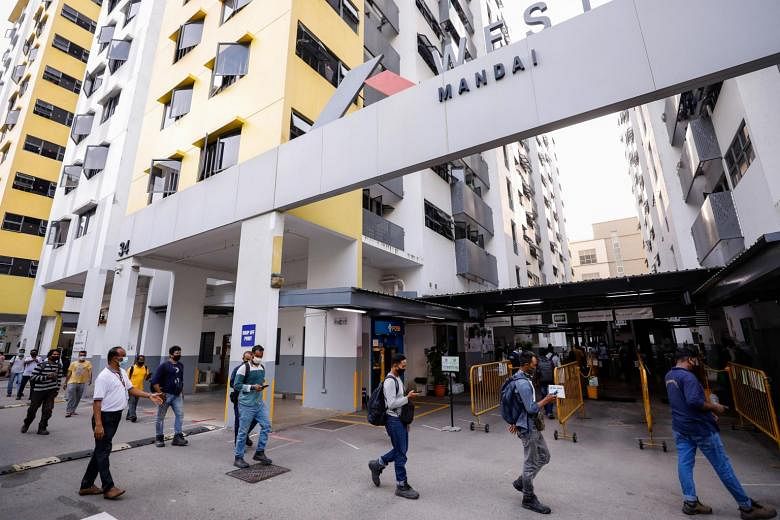SINGAPORE - Larger dormitories here can expect to be audited at least once a week as part of a new programme to strengthen the implementation of safe living measures and minimise the Covid-19 infection rate in dormitories.
The Ministry of Manpower (MOM) said on Wednesday (Oct 21) that the new Infection Prevention and Control (IPC) programme will be rolled out to all dormitories across the island, aimed at curbing the spread of future infectious diseases in dorms.
Developed by the MOM's Assurance, Care and Engagement (Ace) Group and the Ministry of Health, the programme targets dormitory operators and staff, residents, and MOM's Forward Assurance and Support Teams (Fast).
While dormitories with 500 residents or more can expect to be audited at least once a week, MOM said that audits for the other dorms will be done during routine inspections.
The audits will be the last step of the programme, which begins with self-assessment and pre-programme quizzes to test dorm operators, staff and residents on their baseline IPC knowledge.
They will then proceed to online training with materials including videos, infographics, and post-training quizzes to consolidate their learning. These materials will be available on the FWMOMCare app that migrant workers currently use to log their health statuses and temperatures daily.
To ensure that gaps are identified and corrective action is taken, audits will be conducted in dorms from about five weeks after pre-quizzes are made available to dorm operators, staff, and residents, said Ace Group medical director Dr Lam Meng Chon.
Auditors will be trained to ensure workers are familiar with hand hygiene like washing hands before meals, proper use of masks, keeping their group sizes to no more than five, and reporting sick when they feel unwell.
Audits will be conducted by MOM's Fast officers, as well as about 100 volunteers from the Singapore Healthcare Corps, of which 40 are nurses familiar with infectious disease management.
Dr Lam said the nurses will help to design remedial actions specific to the dormitories and the workers.
However, while the programme materials will not be made compulsory for workers, Dr Lam said that dorm operators should encourage their residents to use them, and that the ministry favours a "partnership model" to engage dorm operators, instead of a "punitive approach" in rolling out the learning materials.
Dr Lam also said that the IPC programme does not replace safe living measures, which will remain the first line of defence against the spread of infections.
He said that safe living measures - which have been in place since May 30 - explain "what needs to be done", and these will be complemented by the IPC programme on "the why and how".
For instance, instead of just telling dorm operators that masks should be worn, it is important to explain that Covid-19 is spread through respiratory droplets, he said.
Dr Lam added that MOM and MOH officers, during their dorm visits, had noted the improper wearing of masks by dorm operators, staff or migrant workers who did not fully cover their noses and mouths.
While the programme materials are currently only available in four languages - Bengali, Tamil, Chinese and English - which are accessible to about 90 per cent of the migrant worker population, Dr Lam said the ministry will increase the number of languages if needed.
The ministry also intends to make the IPC programme current and updated, and will revise educational resources when knowledge gaps are identified.












